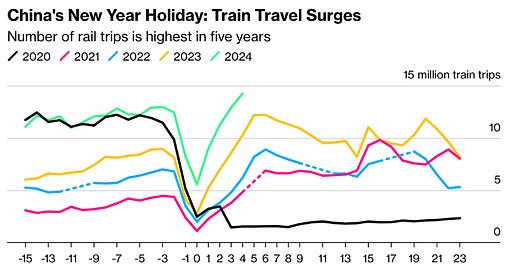It’s that time of the year in China when the entire country is on the move.
Trains rumble, planes ascend, and cars snake their way into a never-ending bend.
It’s the season of Chunyun (Spring Festival travel rush), which begins a fortnight before the lunar new year and lasts for forty days. Millions embark on a journey back home to celebrate the lunar new year and open their wallets to spend on travel, retail, catering, and more.
This year too, consumers surged on a much-needed spending spree as the 8-day holiday kicked off on February 10th, fueling domestic travel and consumption. This gives an indication, early in the year, of the country’s consumption trends.
While the official data for 2024 is yet to be released, projections point towards graphs exceeding all previous peaks witnessed in 2019.
This throws up a question of whether an extended holiday and festive atmosphere offers a shot of energy and invigorates the economy?
Since 2014, China has reworked to group its national holidays with the weekend and encouraged make-up working days. While China technically has 7 official public holidays, the combination of extended holidays and unofficial practices can lead to periods with up to 11 days off throughout the year.
While creating these periodic extended holidays declutters travel, it certainly has influenced the economy over the years, especially in retail and catering.[1]
Fueling the Future
India's public holiday system comprises mandatory gazetted holidays (17 in 2024) for central government employees and agencies, with most schools and local bodies observing closures. Additionally, a yearly list of restricted holidays (31 this year) allows flexibility for employees in adhering businesses and state agencies, while local authorities can also declare their own holidays.
Public holidays offer valuable time for families to connect, but could strategically grouping them with weekends lead to a more vibrant economy?
Moreover, given that 60% of India's economy relies on domestic consumption and investment, should India explore consolidating public holidays with weekends to potentially stimulate domestic spending and further boost economic activity?
Although public holidays remain popular[2], the impact on the economy is a complex and multifaceted issue with arguments on both sides.
Extended weekends could encourage people to travel more, potentially boosting sectors like tourism, hospitality, and retail. This could also increase job creation and revenue generation in these sectors. Consumers might have more time and opportunity to shop and spend during extended weekends, especially in tier-1 and tier-2 cities, potentially boosting overall economic activity across various sectors. Contact-intensive services like trade, hotels, transport, and recreation – a subsect of the services sector, is a growth driver for the economy.[3]
Broad-based growth in India’s Services sector
A measured approach
Grouping holidays with weekends might boost service industries but could disrupt manufacturing and agriculture. Manufacturers could face delays and inefficiencies, while shifting holidays in agriculture might clash with crucial weather-dependent activities, potentially impacting crop yields and farmer income.
Moreover, some holidays hold significant cultural and religious significance, and adding make-up work days could lead to social discontent and resistance to the change. Not to mention, the administrative and political complexities in implementing and managing the holiday calendar changes may create friction between the Centre and the State governments in India.
While strategically grouping holidays with weekends has the potential to benefit the economy, it's crucial to carefully weigh the potential drawbacks.
To account for India's economic diversity and state-level variations, a pilot program could be implemented in select states with significant service sectors and diverse economic profiles. Monitoring indicators like state-level UPI transaction data, vehicle registrations reflecting car purchases, travel bookings, and toll booth collections, would provide valuable insights before potentially scaling the policy nationwide.
In addition, instead of a blanket reform grouping all public holidays in India, a more targeted approach focusing on major festivals like Dussehra, Diwali or Pongal could be considered. This strategy balances potential economic benefits with administrative feasibility and avoids overwhelming infrastructure. Similar to the successful 2008 reform in China, which replaced a single "Golden Week" with three strategically chosen traditional holidays, India could pilot grouping holidays around festivals with high consumption demand.
While Keynesian theory suggests increased spending can stimulate the economy, in the specific context of India, including diverse regional economies and potential disruptions to other sectors, it needs careful consideration. Only through thorough analysis and pilot programs can we determine if grouping holidays would truly nudge the Indian economy toward a more vibrant future. Until then, treat your weekends as a vacation!
[1] https://news.cgtn.com/news/3d3d674e35416a4e32457a6333566d54/index.html
[2] ANAND, P., J. KRISHNAKUMAR, AND N. B. TRAN (2011): “Measuring welfare: Latent variable models for happiness and capabilities in the presence of unobservable heterogeneity,” Journal of Public Economics, 95, 205–215.
[3] https://www.indiabudget.gov.in/economicsurvey/doc/echapter.pdf






